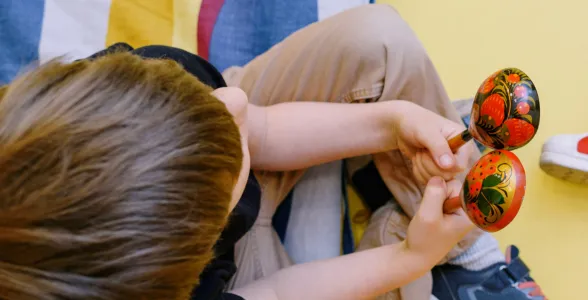
Grief and Music
Grief is a journey. Like landscape it makes its own demands: there are rocky paths, rivers to cross, slopes to climb, views to observe, occasional places to rest and shelter. One thing is for certain – the journey will end in a place far away from where it began. Music and music therapy can change to reflect the passage of time, the landscape and the experiences; it can accompany you like a soundtrack; it can lead to meaningful relationship at a time when support is most needed. And it can even provide something fun and new when it is least expected.
How do we help people cope with the grief that comes when someone we love dies? Is death the only legitimate reason to grieve? Can music play a part in supporting people and if so, how?
All through the ages people have used music to express something when words simply aren’t enough. When words don’t work at all, ‘music expresses that which cannot be said and on which it is impossible to be silent’ (Victor Hugo). But even when words are physically possible, it can just seem like they are not strong enough to express that which needs to be expressed. In this way music can bring life and meaning to words that are struggling to be heard. It can also put a frame round feelings and emotions, containing and holding them.
Loss
Most people associate grief with people or animals dying, but grief can actually be a reaction to many different losses, such as the loss of senses (hearing, sight etc); loss of faculties (walking, swallowing, speaking, brain function etc.); loss of control over body parts or bodily functions: the loss of a job or occupation, or the ability to do it; divorce; dementia; the loss or anticipation of loss when someone you love is slowly deteriorating; losing the ability to drive; loss of friendships, or the perceived loss, which feels very real (e.g. as the result of rejection sensitive dysphoria); loss of your identity; loss of happiness (e.g. when a person has depression); loss of dreams hopes and wishes, or the loss of something you never had (such as a relationship or the child you had wished for). The list goes on. All of these things are valid losses and often people struggle because they don’t realise that they are grieving. Grief, on the whole is something that never goes away, but you can be supported to live with it and learn ways of coping with it and making it more manageable, so it doesn’t take over your life.
Music
What can music do to help?
Music does not require words, it has no ‘meaning’
When it is hard to find words to express oneself, improvising music together can create a bonding, a connection that can be powerful and reassuring.
A tune or song can pass time, when days can feel endless
Music has its own relationship to time. It is not like an image which can be grasped with a single glance….music draws you through time as it passes through phrases and cadences that give it shape.
Music can provide structure when life feels upside-down
Musical structure can provide a framework for focusing on the loss, whilst transforming it into something new, personal and even beautiful.
Music can offer a legacy
Songs can capture what has been lost – a loved one or a way of life, and celebrate those significant experiences that were gained.
Music Therapy
Music therapy can bring meaningful activity, hope, shared engagement, and something new, at a time when other avenues of experience seem to be closing down. Music therapists work with people individually, or in groups, at any stage of their time of loss and grief. There is no right or wrong way to make music in music therapy and nobody needs previous experience of playing an instrument or singing. Instead, a trained therapist can help to explore, acknowledge and reframe the loss and grief in musical ways, offering respite from the isolation.
Playing instruments with a Music Therapist can help you to express emotions without using words and at other times it will help you to relax and enable you to speak, if that is what is needed.
Another technique that is often used in music therapy sessions is songwriting. Some people write songs about what is happening to them, others might write about their life, while others write songs about the person that they have lost. Writing your feelings down or making them into a poem can in itself be therapeutic, but putting those words to music adds a different dimension and as one client described the process, it ‘puts a frame round your feelings’.
Support our Work
Help us to provide Music Therapy to the most vulnerable and isolated members of our society
Donate here

.webp)


.png)